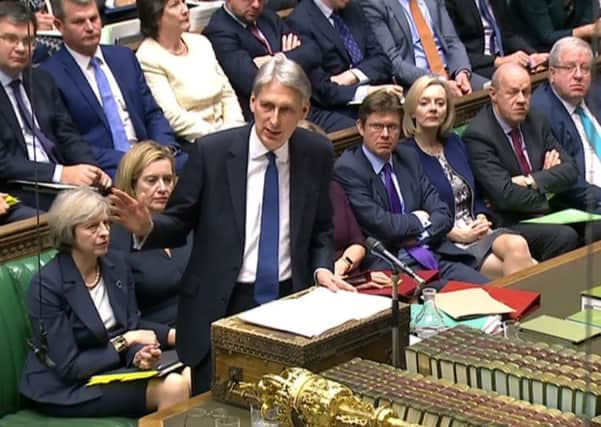Bill Jamieson: Abject apologies for doubting debt bonanza


I’ve been so wrong. I have written often in this column about the supposed dangers of deficit and debt, warning about living beyond our means, the dangers of high debt-to-GDP ratios and the insufferable burden of ever-rising debt interest payments.
These concerns I now see have been utterly misplaced. I have missed a great turning point in our circumstances – the New Normal, the unbearable virtue of Living Beyond Our Means.
Advertisement
Hide AdAdvertisement
Hide AdNothing short of a full recantation is now due when the government – yes, a Conservative government – brushes aside its failure to meet its borrowing reduction targets since 2010 and has just proposed to increase this overshoot by piling on another £122 billion of borrowing over the next five years.
As for outstanding debt, this is no longer seen as a cause for concern, still less a constraint. The country’s debt total is now heading towards two trillion pounds.
For the avoidance of doubt, one billion is a thousand millions, and one trillion is a thousand billions, or equivalently a million millions, or simply in this case a ‘2’ with twelve zeros after it, like this: £2,000,000,000,000.
What’s another nought or three when the figure gets this big?
Time was when the UK signed up to the Maastricht Treaty limit that debt should not exceed 60 per cent of GDP. Then, in the banking crisis, it hit an emergency “short-term” peak of 80 per cent of GDP. Chancellors solemnly pledged to bring it down. But last year it hit 84.2 per cent of GDP. This year it will hit 87.3 per cent. And it will continue to rise, to 90.2 per cent in 2017-18.
But why worry? Debt-to-GDP is just a statistical abstraction. It might exercise economists but means nothing to ordinary people – except for this: the annual cost of debt interest.
These annual payments – running at “just” £21 billion in 2002-03 – will climb to more than £50 billion next year, to £52.6 billion in 2018-19 and will remain above £50 billion out to 2020-21. Our debt interest charges are already the fourth largest budget cost after social security, health and education. And these figures are before making any allowance for higher interest rates in the period ahead.
But need we worry? Interest rates are rock bottom and unlikely to rise by much – or so we hope. And we can always borrow more, to help meet the rising interest payments on the existing debt. So it’s not just that my concerns have been misplaced. I’ve missed the throwing of the magic switch by which This Time It’s Different and We Can Have It All. I’m on the wrong side of history.
Advertisement
Hide AdAdvertisement
Hide AdAnd all this calmly and reassuringly unfolded by a Chancellor who has been described as dull, cautious, unexciting and “steady-as-he-goes”: what an achievement!
In all of this the Scottish Government can hardly grumble. It’s already borrowed beyond the hilt. The latest official figures show Scotland’s deficit (what the administration laughably calls “the Net Fiscal Balance”) in 2015-16 was £14.8 billion or 9.5 per cent of GDP, or more than twice the percentage level of the UK.
Now the Chancellor has signalled that Scotland will receive an extra £800 million for capital spend here through Barnett consequentials. Sounds generous? It’s spread over five years, giving an annual “boost” of £160 million. An Inverness economist crisply summarised it “peanuts, to use a non-technical description.”
In any event, surely extra government borrowing and debt is justified at this time? We are in a period of great uncertainty. Businesses and households are deeply apprehensive about what lies in store – though the economy is growing faster than thought. And that extra £23 billion of spending on infrastructure, research and development and innovation will surely help boost growth and improve productivity.
But there is no settled conviction among economists that such spending really does much to improve output per person. German productivity is certainly higher than ours, but its third-quarter GDP growth averaged just 0.2 per cent quarter-on-quarter.
Public sector projects, from transport to IT installation, have a recurring tendency to overshoot both on budget and on time (think trams). Their main economic benefit has been job creation, though this is not the same as productivity improvement, and there is the danger that many pet political projects will now be rolled through under the guise of national advantage.
Arguably the greatest prop in the argument for ever more borrowing and debt has been the siren warnings in the wake of the budget. The Resolution Foundation says lower earnings and higher inflation could mean incomes growing less than half as fast between 2015 and 2020 compared with the years following the financial crisis and the recession that followed.
For good measure the Institute for Fiscal Studies says workers will earn less in real wages in 2021 than they did in 2008 and the biggest losers will be lower income families. “This has, for sure, been the worst decade for living standards, certainly since the last war and probably since the 1920s,” says IFS director Paul Johnson.
Advertisement
Hide AdAdvertisement
Hide AdReally? That seems a tad over-excited given near record numbers in work, the sharpest rise in retail sales in October for 14 years, with Black Friday sales likely to top £2 billion, and mortgage lenders recording the highest quarterly number of first-time buyers in Scotland for nine years.
Meanwhile net personal loans to consumers and overdrafts in November jumped to £446 million, way above the monthly average of £307 million. But that’s the thing with the debt and borrowing bug: if the government can get away with it, why not the rest of us?
So my contrition and apology is without reservation. It’s all different this time. Debt is good. More of it is even better. Prudence is for wimps.